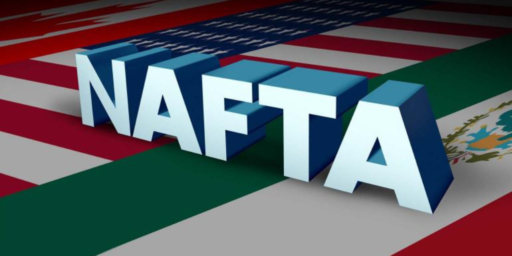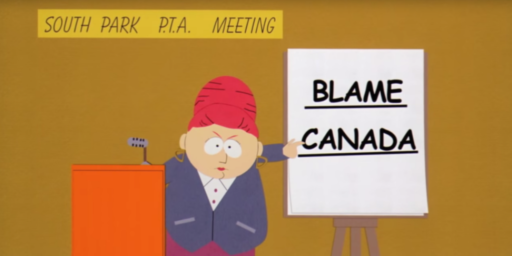Open Thread on Free Trade
The recent House passage of the Central American Free Trade Agreement (CAFTA) got me thinking: where is there any evidence that free trade agreements are good for America?
Obviously a loaded question, its answer based on what you believe America needs. Clearly in the 25 or so years since Keynesian (state-led) development was replaced by what is best defined as global neoliberalism, the United States has seen steady economic growth and increased GDP per capita. But these are aggregate numbers; in this same period of time, real wages have either been stagnant or have declined — meaning that the rich have gotten richer while everyone else has been running in place.
Also, when NAFTA was rushed through Congress in the early 1990s, we were promised that our exports to Mexico would increase while illegal immigration would virtually cease. Neither promise became reality. All that NAFTA seemed to do was to put Americans out of work, or shift them from well-paying jobs to lower pay working in the service sector. Perhaps more Mexicans now have work, but I’m more concerned with the plight of my unemployed neighbor than I am about them.
It is true that we now have $49 DVD players and 99 cent hamburgers, but the price of big-ticket items — houses and cars for example — continue to climb out of the reach of anyone making median wages.
Globally, the issue is the same; it is undeniable that real incomes in developing nations have increased, but relative to local elites they have declined, just as they have in the United States. And every single study of civil violence acknowledges that absolute gains mean nothing when there is a relative loss — meaning that current development programs are actually contributing to instability in the Third World.
I don’t pretend to know the answer here, but it seems to me that the theory of free trade is one thing and the reality is another. I understand Ricardo’s comparative advantage and Schumpeter’s creative destruction, and they look great on paper. The evidence, however, suggests that such theories have not led to appreciable gains for the average American. Globalization can’t be stopped, but do we necessarily want to speed up the process? Are the flaws of the Keynesian state really solved by unfettered transnational capital? Is the purpose of our economy to simply increase GDP, or are questions of equity something to be considered?
Chime in with your thoughts.





Show me one statistic that shows the average American salary going down in the period since NAFTA. Show me one statistic that shows that the unemployment rate in the US is significanly higher since NAFTA.
You cannot just make a (false) claim like that and not back it up.
You don’t even seem to know the numbers.
but the price of big-ticket items — houses and cars for example — continue to climb out of the reach of anyone making median wages.
And yet the numbers show that cars continue to get bigger and nicer, houses continue to get larger, home ownership is at an alltime high, car ownership is at an alltime high, etc. So the numbers contradict your point. (Even hours worked have been decreasing.)
real wages have either been stagnant or have declined — meaning that the rich have gotten richer while everyone else has been running in place.
Real wages have been fairy stagnant, while real compensation has been increasing at a nice clip. That’s because benefits have taken up a larger proportion of total compensation. Consider the Family Leave Act– that instantly reduced the grow in real wages by directing some of it towards family leave. All sorts of laws designed to encourage benefits decrease take home pay.
You also can’t count out immigration. People who have been in this country since the 1990s have seen their incomes rise. But at the low end there have been lots of people coming to this country from even poorer countries. They’re poor here, but they’re wealthier than they were in their old countries. Everyone’s better off than they were, but because we continually accept very poor people from other countries, the overall wage picture for the country as a whole doesn’t increase that much. Not that I’m against immigration at all, surely, but one does have to admit that when lots of poor people come here from other countries it decreases average income and wealth.
Michael: read the second paragraph; I admit to your points on aggregate numbers, but I’m talking about distribution here.
John: I’ll have to look into your first point, although it would still be true that there has been a relative loss for the middle- and working- classes.
As for your second point, you seem to be saying that the numbers are skewed by new poor people. That makes some sense, but how poor would a few million immigrants have to be to alter the overall numbers of a country with 300 million citizens?
I tried to find the data on Mexican wages that I had seen recently and couldn’t find it; suffice it to say their wages, relative to the U.S., have dropped since they entered NAFTA. So, either their wages are dropping or the U.S.’s are rising.
As for CAFTA, I’m glad it passed because we started it and having it fail would have been a setback. However, there’s very little in the way of economic gains and more to be gained politically. If this agreement keeps the CAFTA countries closer to the U.S. — and less close to Hugo Chavez — it’s a long-term win for them and the region as a whole.
Bilateral trade agreements all have essentially the same economic problem: trade diversion. We are basically giving these countries a comparative advantage when they might not be the low cost producers of the goods we trade in. I’m far more interested in seeing the Doha Round of trade talks succeed.
As for Americans, I remain convinced that trade makes us better off by increasing our purchasing power, among other things. There will be additional churning in the job market, and lost jobs, due to free trade, but that seems more like an argument for trade adjustment assistance rather than an argument against more trade.
Michael: no need to be insulting.
Real Disposable Income has been rising every month except two in the last two years.
Here is a graph of graph of Real Disposable Income Per Capita monthly since 2003.
Real Median Household Income is down a bit from the high in 1999-2000, but the downward trend is now a flat trend, and it is still higher than before 1998.
Wages only tell part of the story. Total Compensation has been pretty steadilly up since the 1980’s. Recently, total compensation rises have been mainly in benefits, rather than wages. The largest benefits are of course health, one of the most highly regulated and non-offshorable industries in the U.S.
If you dig through National Economic Trends, you will also see that quarterly real consumption increases have been above zero since 1991, so we certainly are all consuming more.
You simply need to look at other OECD nations, such as Germany, France, and Italy to find much lower GDP growth and high unemployment. The Euro area as a whole hasn’t seen year-on-year GDP growth above 1% since 2001, while the US has been above that since then.
The US is doing pretty good for a huge developed economy, yet with 10% of our population born outside the country (which I think is an overall good thing, but makes the stats look worse).
I fail to see the importance of relative distribution. If I’m twice as rich (in purchasing power terms) as I was N years ago, I’m still better off, even if Bill Gates is ten times as rich as he was.
If you are referring to manufacturing jobs this is not the case. The decline in manufacturing has been going on for something like 25 years or more. There is a change in the economy from jobs require little education to those requiring more education. The idea of getting a H.S. degree and getting a good paying job at the local plant just isn’t realistic for most people.
One solution is to pump up current H.S. educations so that Americans are more competitive for these jobs that require more knowledge. Of course, this kind of thing isn’t likely to happen anytime soon with our political system (at least for public schools).
But why if most people can’t afford them? Supply and demand indicates that as the demand decreases then price should decline. A drop in income will shift the demand curve inwards dropping the price. So what is going on? Why are housing prices going up as more and more people become less able to afford them? Is the supply and demand model which has shown to have a great deal of explanatory power now invalid (a possibility) or is it perhaps that the decline in wages is perhaps somewhat overstated, or that the measure of wages is no longer valid?
With regards to terrorism a recent NBER study notes it isn’t poverty, but oppression. Could oppression in third world countries be the driver here as well? Could people percieve the relative loss as a result of oppression and that is what leads to violence?
Sure wages have declined, but at the same time what about benefits? The cost of health care has risen dramatically, and getting the same benefits from one year to the next would constitute a net increase in the value of benefits. Looking at total compensation might show that one reason wages have not risen much is due benefits sucking up all the increase.
Why is health care rising so rapidly? Could one reason be that the government subsidizes consumption of health care by some of the largest users (the elderly)? Also, could it be how our system is a mish-mash ad-hoc private-public mess?
Just some thoughts to toss out there.
Maniakes: you’re absolutely right from an empircal standpoint, but history has shown that psychologically people resent relative loss even when they make absolute gains. The issue is equity.
Robert: you make a key point — that perhaps we have to sacrifice some in terms of becoming a bit dependant on small nations in exchange for them becoming very dependant on us. It’s as if we’re going back to a spheres of influence model.
At the end of the day, the fear here is that the masses (both nationally and globally) will succumb to resentment and lash out at those in power. In other words, threatening the very stability of the system.
Stotch,
I ordinarilly love your stuff, but macroeconomics is not your thing. There’s no shame in that. I’m not much of a scholar on legal or medical issues, though I do have opinions on them.
First of all, people are getting richer a lot faster than you think. Read this synopsis of the income gap vs. income mobility issue, then click through to Arnold Kling’s piece:
http://www.vinod.com/blog/News/KlingontheRichPoorGap.html
In a nutshell, poor folks generally make a lot more money than you think after a few years.
Second of all, real estate costs more as a share of income because God stopped making land, but he still makes plenty of new people. Supply and demand. Because food, clothing, communication, and information are becoming cheaper on a relative basis, people are willing trade off an increasngly large share of income to secure premium housing.
In other words, houses cost more because we are so prosperous. There are more homes in the US than there ever were before. They aren’t empty, people live in them.
Thirdly, unemployment is low. Very low. Unemployment is currently below what was considered the MINIMUM sustainable rate in the Reagan years. (nonaccelerating
inflation rate of unemployment aka NAIRU) See first paragraph. If the 6% figure really is/was NAIRU, the only way to grow the American economy safely would be through outsourcing MORE labor to give US consumers the benefit of more goods without driving up US inflation.
Fourth, wage rates for unskilled labor are ALWAYS driven by supply and demand. Factory work can be shipped offshore. Lawn-mowing and house-cleaning must be done locally. If you really want to help low-skilled workers, create a shortage of them. Train more people to do higher-value work. The few people left to mow lawns will have more pricing power.
The alternative is to basically seal the border (imposing tariffs) and prevent competition between American unskilled workers and foreign unskilled workers. Sure, US workers may make a bit more in the very short term, but US factories will rapidly become uncompetitive with foreign companies, killing the American export industry. All the while, ou crete huge deadwieght losses to the US economy. Those losses will be borne disproportionately by the poor.
Why? Because the poorest people need the cheapest stuff… Clothes, toys, and furniture made in china and sold at Wal-Mart. Do you want to double the price poor folks pay for their stuff?
Lastly, trade wars are a less-than-zero sum game. Just because tariffs make offshore production unprofitable does NOT mean that production will be moved to the U.S. Projects simply become unprofitable, and plans are abandoned before they ever leave the drawing board. Everybody loses.
I know you’re looking for statistics. They are out there. I know I should point you to a few specifics. I also know that I will find a bunch of stats just by cracking open any reputable international macroeconomics book, any issue of the Economist Magazine.
I apologize if my tone was too harsh. It’s just that protectionism makes about as much sense as the lose-weight-without-exercise plans on late night infomercials… It sounds plausible and even seductive, but it does not stand up to scrutiny.
Absolute vs. Relative incomes.
One set of my grandparents both grew up drinking water from the creek and crapping in a hole the ground.
I don’t give a tinker’s damn what Bill Gates makes – I really, really appreciate that I have indoor plumbing and air conditioning. And a car. And a job that doesn’t involve stoop labor.
Studies Say… but my guess is if you gave every Salvadoran family a house with indoor plumbing and a/c and a car to drive to a job that didn’t cut into their life expectancy, they wouldn’t give a damn what El Jeffe made either.
Stotch,
Your arguments against free trade seem to mirror those discussed here:
http://www.epinet.org/content.cfm/briefingpapers_bp147
Here is another counterpoint to consider: A trade deficit is also a capital surplus. Foreigners believe the US economy is so strong that they accept US dollars for payment. If America’s prospects were dimer, the dollar would decilne until trade accounts were in perfect equilibrium.
Also, here is a source of lots & lots of pro-trade statistics:
http://www.freetrade.org/
Rather than cite one or two stats, you might want to skim some of the papers here:
http://www.freetrade.org/talkingpoints/talkingpoints.html
In a nutshell, the deadweight losses of protectionism far outweigh the short term benefit to a narrow slice of the population… And even that income benefit would likely be outweighed by the detriment of much higher prices.
As I asked earlier in another comment thread, someone name me one country that practices “free” trade. Every one of them has some form of protectionism. So any discussion of “free” trade seems to be nothing more than an abstraction. What we really want is “unfree” trade that benefits us. That’s what NAFTA is, really. CAFTA, too.
The problem is that our free trade is slave trade in someone else’s products today. The central banks which finance our $500+ billion trade deficit have to steal it from someone. Receiving stolen goods is not moral; likewise free trade in stolen goods is not morally defensible. Similarly, the products of child labor tend to be stolen goods, and that is how the third world works; but is not morally acceptable to have free trade in such goods. It is impractical also, because raising the demand for child labor in the third world, causes the birth rates to stay high. Per capita increases in investment in production are thereby gravely retarded, unless some natural resource bonanza arrives for them. This is how free trade of an unscrupulous kind, can increase or maintain poverty. If we did not pay them to make more unskilled workers than ordinary growth rates can absorb, wages would be rising almost everywhere.